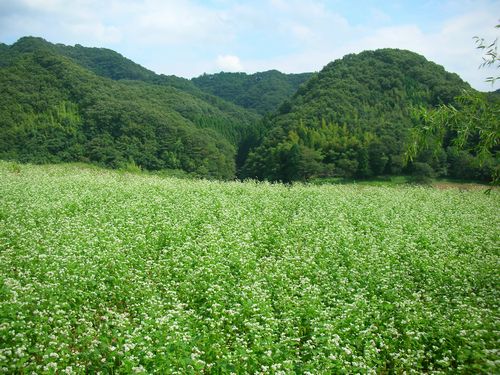February 18, 2011
Research Institute Links Forest Biodiversity to Buckwheat Crop Yield
Keywords: Ecosystems / Biodiversity University / Research institute

Copyright Forestry and Forest Products Research Institute
Japan's Forestry and Forest Products Research Institute released the results of a survey on November 16, 2010, showing the relationship between biological diversity in forests and the seed setting rate in buckwheat (the main ingredient in soba noodles) cultivated in semi-mountainous areas. The results of the survey revealed that richer forest biodiversity contributes to greater harvests of buckwheat.
The survey was conducted to show that rich forest biodiversity contributes to human life (called "ecosystem services"), a relationship still not well understood. Since small insects such as bees, ants, flies, syrphid flies, and flower beetles pollinate buckwheat, good seed setting depends on their activity.
The survey was conducted on buckwheat fields with different environmental surroundings in the city of Hitachiota, Ibaraki Prefecture, and compared seed setting rates with the number and species of insects that visited the fields. The results revealed that buckwheat fields surrounded by vegetation rich in biodiversity such as forests or grasslands attracted more insects for pollination, which led to better seed setting.
The Institute states that this research showed that the existence of vegetation with richer species biodiversity such as forests supports greater harvests of agricultural products. It also suggests that forest protection helps to maintain ecosystem services by preserving biodiversity.
Posted: 2011/02/18 06:00:15 AM
Reference
Forestry and Forest Products Research Institute official website
http://www.ffpri.affrc.go.jp/en/
Related
"JFS Newsletter"
- 'What Are the Roles of Zoos Today?' - Interview with Director of the Popular Asahiyama Zoo
- Nishiawakura's Initiative for 100% Energy Self-Sufficiency, and a Municipal ICO Scheme
- 15-Year Integrated Forest Environment Education in Shimokawa, Hokkaido to Support Sustainable Forest Management
- Fifth Contest to Award Excellent Environmental and Social Practices by Junior High, High School Students
- Increase Revenues without Increasing Catches -- How the Sustainable Sakura Shrimp Fishery in Suruga Bay Does It


